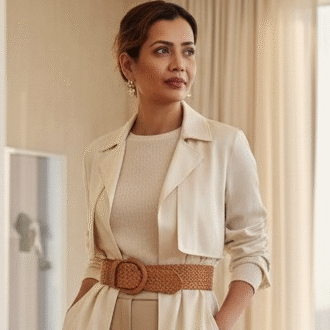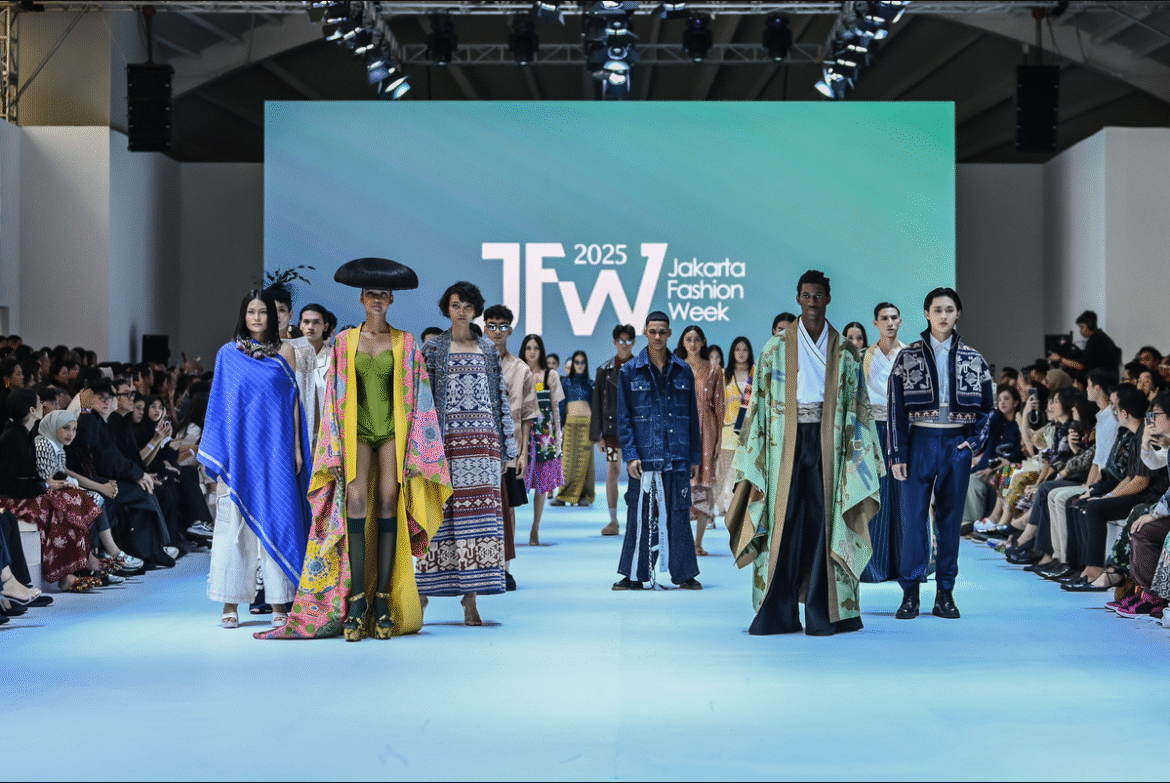Jakarta, Indonesia — November 3, 2025
From October 27 to November 2, 2025, Jakarta Fashion Week 2026 transformed Pondok Indah Mall 3 into the epicenter of Southeast Asian fashion, delivering a resounding statement: Indonesian fashion has arrived on its own terms. The seven-day spectacular featured over 100 designers presenting 1,800+ looks across 34 fashion shows under the theme “The Legacy of Style”—a celebration of harmony between Indonesia’s rich cultural heritage and bold contemporary vision.
But this wasn’t just another fashion week. As MEGA Magazine observed, “Jakarta Fashion Week 2025 revealed a region no longer seeking validation, but only expression… In an age where global fashion often feels like an echo chamber, Jakarta’s runways spoke in their own rhythm, where the act of dressing became a kind of cultural translation.”
The message was clear: Indonesian fashion has matured into a confident regional leader, asserting its own authority rather than chasing approval from Paris or Milan.
A Week That Redefined Regional Fashion
Held at City Hall, Pondok Indah Mall 3 in South Jakarta, the event strategically embedded high fashion within a retail environment—creating seamless connections between runway spectacle and commercial reality while maintaining prestige through invitation-only shows for buyers, celebrities, and media.
The opening ceremony on October 27 featured prominent government officials including Rano Karno (Deputy Governor of DKI Jakarta) and Widiyanti Putri Wardhana (Minister of Tourism), confirming official backing for Jakarta’s fashion ambitions. Deputy Governor Karno notably challenged JFW to prepare for Jakarta’s 500th anniversary in 2027, positioning fashion as central to the city’s cultural identity.
“Style is not just about fleeting trends, it is a living legacy of values, character, and artistry,” declared Svida Alisjahbana, CEO of GCM Group and JFW Chairwoman, articulating the vision that permeated every aspect of the programming.
The Grand Finale: DEWI Fashion Knights
The closing spectacle DEWI Fashion Knights occupied two prestigious evenings on November 1-2, representing the apex of Indonesian fashion achievement. Six carefully selected designers showcased collections that embodied “Nusantara”—the concept of Indonesian archipelago unity transforming heritage into inspiration for new creative generations.
Saturday, November 1 opened with TANGAN Privé presenting their “10 Years Anniversary Collection” exploring Indonesian identity through corsetry, tailoring, and kebaya reinterpretation across 18 looks. KRATON Auguste Soesastro followed with “Made in the World,” inspired by ancient Sumatran trading ports and featuring Indian jacquards, Japanese brocades, and Sumatra songket.
TOTON—founded by Parsons-trained designer Toton Januar—closed the first night with “Regang/Pulau Emas,” exploring Acehnese traditional women’s dress through upcycled materials and hand-painting, demonstrating that sustainability and cultural preservation are complementary values, not competing ones.
Sunday, November 2 brought Tulola presenting “Angin Sabana,” a theatrical jewelry-focused collection combining spirituality and Eastern Indonesian traditions. Sapto Djojokartiko showcased “The SAPTOJO Heritage Capsule Collection” featuring Bali songket with embroidery in earth-tone natural colors.
The ultimate closer belonged to Sebastian Gunawan Signature—one of Indonesia’s most established couture houses—with “Kembang Jiwa,” reinterpreting kebaya and batik with modern silhouettes and architectural structures.
Collections That Defined the Moment
Several collections emerged as defining statements of Indonesian fashion’s current direction and cultural confidence.
BIASA, celebrating 30 years in business, presented their first runway show after three decades—a momentous occasion attended by major political and business figures including Puan Maharani (Speaker of Indonesia’s People’s Representative Council). The three-part “Rhapsody” collection moved through “Harmony” (black-and-white ‘Saput Poleng’ motif), “Nature” (rich indigo with natural dyes), and “Sangha/Community” (earthy tones with flowing dresses). MEGA Magazine called this the most anticipated show of the week.
STUDIOJEJE presented “Kembang Tujuh Rupa” (Seven Flowers), a slow fashion collection celebrating rebirth through traditional embroidery and hand-weaving. Designer Angelita Nurhadi, trained in textile design at Bandung Institute of Technology, represents the younger generation maintaining traditional techniques while creating contemporary narratives.
The collaboration between Sejauh Mata Memandang and artist Eko Nugroho on “Republik Sebelah Mata” stunned audiences with an avant-garde approach to circular fashion. Founded by Chitra Subyakto as a textile label focused on circularity and waste reduction, Sejauh collaborates with artisans from Java, Bali, and Sumba, with 90% women team and 70% women artisans—all GOTS certified.
ADRIAN GAN delivered “Kalajenggama,” an avant-garde fusion of Chinese aesthetics and Indonesian culture. Renowned for exquisite Cheongsam designs with intricate embroidery, Gan used old fabrics—lace, curtains, Indonesian textiles—to create a moody rustic aesthetic that honored his Chinese-Indonesian heritage while asserting a distinctly Indonesian design identity.
Building Tomorrow’s Fashion Ecosystem
Jakarta Fashion Week operates as a comprehensive ecosystem builder rather than a standalone event. The Fashion Force Awards 2025 continued JFW’s 17-year commitment to discovering and developing emerging talent through structured competition and mentorship.
In Ready-to-Wear, White Noise FM® (by Dekza Arlingga) won with “Fe [FIFTH ePOCH],” inspired by Hesiod’s “Myth of the Five Ages.” The Accessories category crowned Wander etc as winner.
But the real success story is the Indonesia Fashion Forward (IFF) program. Since 2012, IFF has mentored 46 designers with documented impact: 173% increase in retail outlets for participating designers, 165% growth in team members, 174% rise in production capacity, and international market reach expanded from 22% to 90%.
At Coterie NYC trade show, IFF presented eight Indonesian brands—demonstrating international market access as a tangible outcome rather than vague promise. Past winners like Tex Saverio, Cynthia Tan, Billy Tjong, and Andreas Odang demonstrate the program’s track record.
The ASEAN Fashion Alliance
The ASEAN Fashion Parade brought regional solidarity to the runway, with Frederick Lee (Singapore) presenting dark poetic fantasy, Rizman Ruzaini (Malaysia) showcasing opulent fluid gowns, and Francis Libiran (Philippines) delivering maximalist cultural luxury.
This regional collaboration positions Jakarta as ASEAN fashion capital building cooperative rather than competitive relationships with neighbors—horizontal collaboration rather than vertical Western hierarchies.
The partnership with KOCCA (Korea Creative Content Agency) brought Korean designers to Jakarta while sending Indonesian designers to Seoul Fashion KODE, building meaningful East-to-East creative dialogue.
Sustainability as Cultural Practice
One of the week’s most significant revelations: sustainability isn’t an add-on for Indonesian fashion—it’s intrinsic. Traditional Indonesian fashion practices—hand-weaving, natural dyes, artisanal production, textile preservation, community-based making—represent circular economy before the terminology existed.
Denny Wirawan presented “KEMBANG DJIWA” (Prosperity of the Soul), showcasing Kudus Batik through tailored pieces with sustainability focus. With 25+ years in fashion, Wirawan exemplifies the established designer evolving with contemporary concerns while maintaining mastery of traditional techniques.
BUTTONSCARVES, founded in 2016 by Linda Anggrea, participated as both designer and Official Beauty Partner. With 40+ stores in Indonesia and 5 in Malaysia, plus appearances at NYFW, KLFW, and LFW, Buttonscarves demonstrates how Indonesian modest fashion brands are achieving international scale.
The Economic Engine
Fashion and creative sectors contributed 7.8% of Indonesia’s GDP (2023) with approximately 4 million workforce, positioning fashion as an economically significant industry warranting government investment.
Strategic focus on the modest fashion market (nearly $100 billion globally) leverages Indonesia’s position as the world’s largest Muslim-majority country to pursue leadership in a segment where cultural authenticity creates competitive advantage.
The event received backing from strategic partners including Pondok Indah Mall (venue), government agencies (Jakarta Tourism and Creative Economy, Ministry of Tourism), beauty sponsors POND’s Age Miracle and TRESemmé, banking partner Bank Tabungan Negara (BTN), and automotive sponsor Mazda Indonesia.
A Digital-First Approach
The TikTok partnership represented the event’s most significant innovation—conducting JFW 2026 Model Search entirely through TikTok auditions made casting accessible nationwide, breaking the traditional agency stranglehold on model discovery.
The 30 Fresh Faces models selected through this program walked major shows, representing democratized access to the industry. Fashion creator Alegeor served as official mentor, bringing authentic creator voice to official programming.
E-commerce integration through TikTok Shop and Tokopedia reflected understanding that contemporary fashion weeks must bridge physical and digital retail. The event operated across multiple platforms with official Instagram @jfwofficial (212K followers), TikTok, and streaming platform jfw.tv providing comprehensive digital infrastructure.
Notable Participating Designers
The comprehensive lineup included established icons, mid-career innovators, and emerging voices:
Established/Maestro Designers: Sebastian Gunawan, Sapto Djojokartiko, Denny Wirawan, Adrian Gan, BIN HOUSE (Obin Komara), Chossy Lattu
Contemporary Powerhouses: TOTON, BIASA, STUDIOJEJE, Sejauh Mata Memandang, KRATON Auguste Soesastro, Rinda Salmun, BUTTONSCARVES
Rising Talent: Christie Basil (2.1M TikTok followers), Temma Prasetio, Andreas Odang, NADJANI, CALLA, SONDERLAB
Luxury Accessories: Tulola Designs (jewelry), MAYARATIH (couture)
Modest Fashion Leaders: BUTTONSCARVES, NADJANI, CALLA, RIANTY BATIK
What This Means for Global Fashion
Jakarta Fashion Week 2026 demonstrated that Indonesian fashion has achieved critical mass—sufficient infrastructure, talent, commercial backing, government support, and cultural confidence to operate as an autonomous system rather than the periphery of Western fashion establishment.
As Shinta Widjaja Kamdani (Chair, Indonesian Employers Association) noted: “JFW has grown to become a fashion benchmark not only for Indonesia but also for Southeast Asia.”
Andandika Surasetja (Creative Director) articulated the vision: “Each edition not only celebrates trends and aesthetics but also promotes growth, sustainability, and the strengthening of Indonesian fashion’s global identity.”
The challenge ahead isn’t proving legitimacy but maintaining momentum, expanding international market access while preserving cultural authenticity, and ensuring commercial success doesn’t compromise environmental commitments.
The Path Forward
The story emerging from Jakarta isn’t “Indonesian fashion trying to be like Paris”—it’s “Indonesian fashion building something entirely different, rooted in tropical climate, cultural diversity, artisanal traditions, and serving massive underserved markets.”
With government backing, commercial infrastructure, educational partnerships with Italian fashion schools (Accademia Costume & Moda, Istituto Europeo di Design), and proven talent development programs, Jakarta Fashion Week has positioned Indonesian fashion as a significant force in the global industry.
As the West continues its centuries-old fashion calendar, Southeast Asia is writing its own rules—and the rest of the world is finally paying attention.
Jakarta Fashion Week 2026 ran October 27 – November 2, 2025 at Pondok Indah Mall 3, Jakarta. For more information, visit jakartafashionweek.co.id or follow @jfwofficial on Instagram.
Story researched and reported by Arahkaii Editorial Team All designer Instagram handles and statistics verified as of November 2025 Fashion and creative sector GDP contribution source: Indonesian government data (2023) IFF program statistics source: Indonesia Fashion Forward official reports

Lina, Founder, Creative Director & Editor-in-Chief
The mind behind Arahkaii. Lina launched the platform to spotlight the designers and brands she kept discovering and thinking “why isn’t anyone talking about this?” She brings a thoughtful, intentional approach to storytelling. She leads the editorial team with a focus on clarity, creative depth, and modern femininity, shaping narratives that feel both elevated and deeply human.She shapes everything from content strategy to editorial tone, is hands-on with every feature, and believes the best content makes you stop scrolling. Currently juggling platform-building, brand outreach, and defending her slow morning ritual as essential creative practice.


